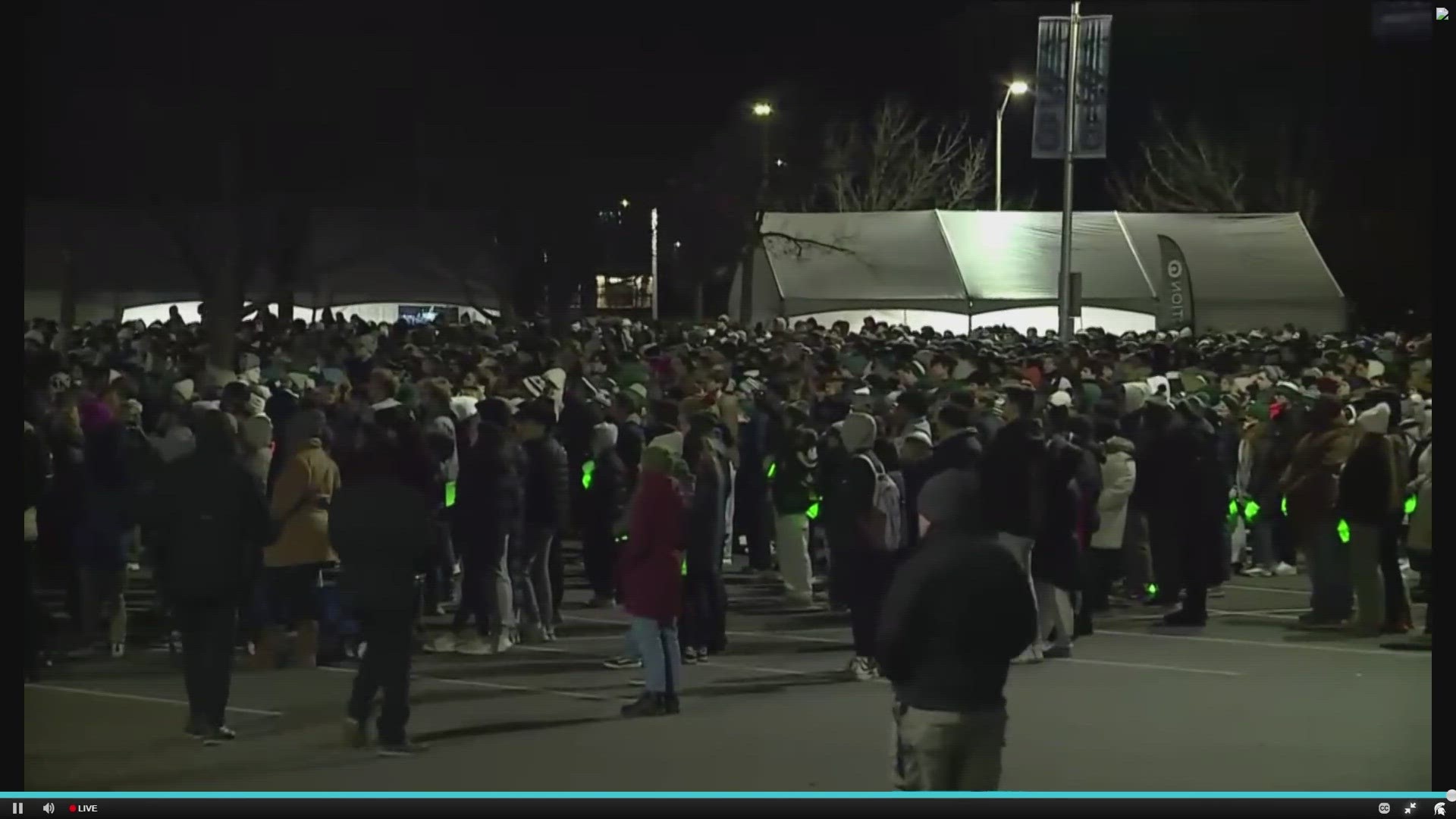1 Year Later, Still Spartan Strong | Michigan State University campus shooting
A gunman killed three Michigan State University students and wounded five others on Feb. 13, 2023. This is where the campus and community stand one year later.
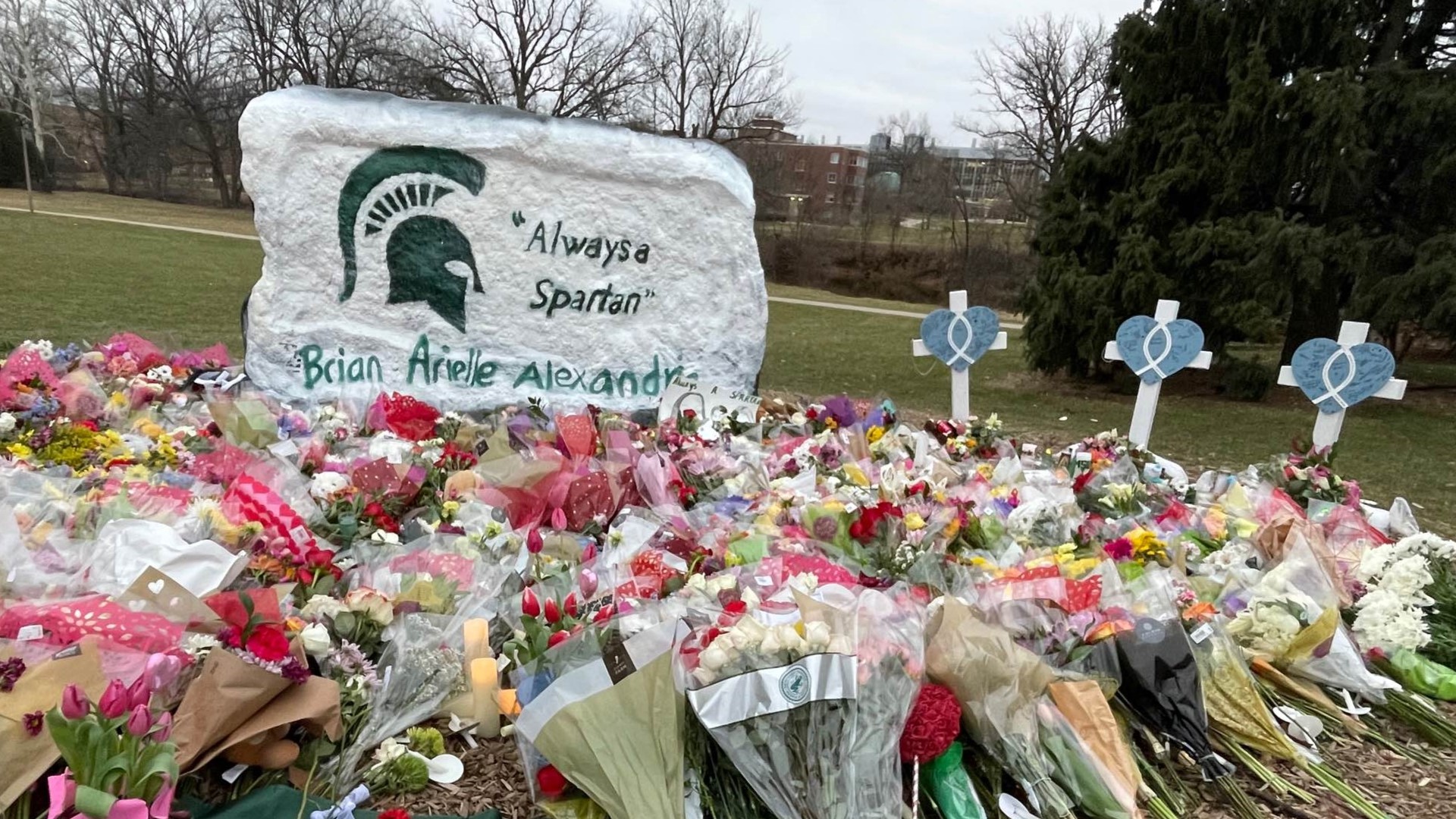
Feb. 13, 2023 What happened at MSU
The evening of Feb. 13, 2023, violence erupted at Berkey Hall and the Michigan State University Union.
A gunman walked into Berkey Hall and the MSU Union during evening classes.
He took the lives of students Arielle Anderson, Brian Fraser and Alexandria Verner. Five other students were critically hurt in the campus shooting. The shooter took his own life hours later.
13 ON YOUR SIDE is not focusing on the gunman. That's not how Michigan State University will be remembered.
As one year later approaches, MSU wants this to be clear: this tragedy does not define Michigan State University.
Leading up to Feb. 13 is assuredly going to bring up a mix of emotions for most. The university intends to offer space and time for those reactions as they honor those lost, injured and impacted by the tragedy.
From somber reflection spaces to a large remembrance gathering to the lighting of luminaires on campus, there are plenty of ways the school and community will honor those lost.
You can learn more about those plans to mark the day here.
'Spartans Together' MSU's plans for Feb. 13, 2024

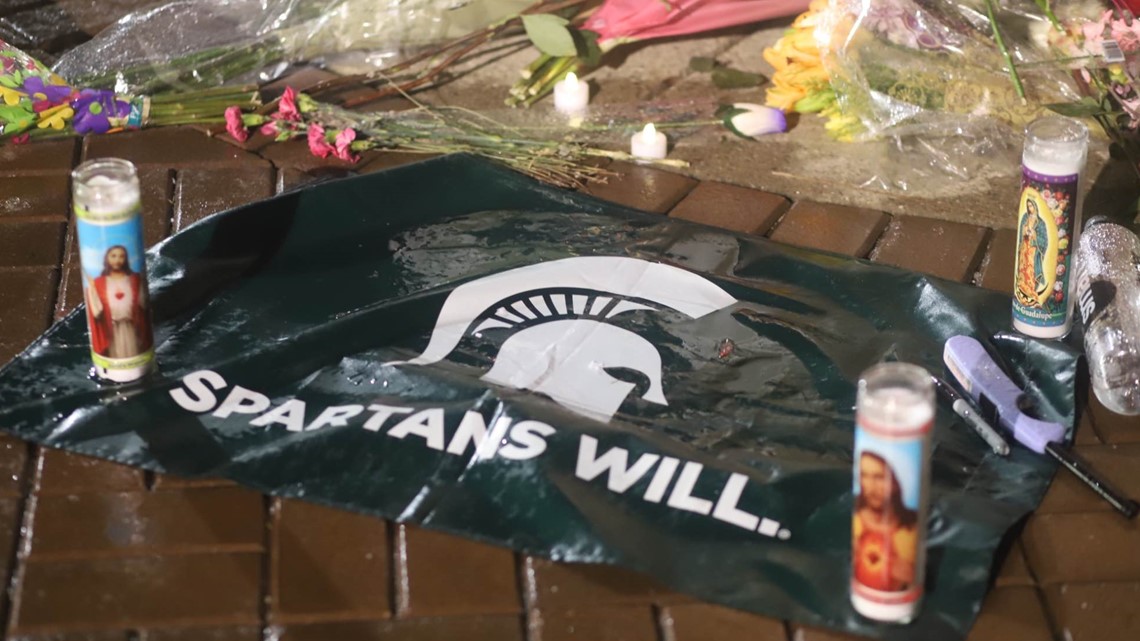
Classes Canceled
Most students will not have classes on Tuesday, Feb. 13. While classes will resume on Wednesday, Feb. 14, the university has instructed faculty to ensure exams and assignments aren't due either.
Luminaries
Spartans around the globe are invited to join the campus in lighting a luminary at 8 p.m. on Feb. 13 from wherever you are.
Alumni chapters across the country are sharing luminaries, and while supplies last, you can also pick them up on the main MSU campus or the East Lansing community from Feb. 5 through Feb. 13.
The luminaries are made out of a white paper bag and a green, battery-operated LED tealight candle. You can make your own if you are not able to get a luminary from MSU.
Then on Feb. 13, you can post a photo of your luminary with a message of support on social media using the hashtag #SpartansTogether.
Remembrance Gathering
For Spartans and community members who want to gather with others, a remembrance gathering is set for Feb. 13 from 7:30 p.m. to 9:30 p.m. in Lot 62 north of Spartan Stadium.
MSU will share a short program at 8:10 p.m. with a prerecorded message, the playing of MSU Shadows, moments of silence, and the ringing of the Beaumont Tower Bells.
This gathering is open to all, and attendees can join and leave at any time.
Program details (times are approximate)
7:30 p.m. - Gathering begins
8 p.m. - Luminary lighting
8:12 p.m. - Prerecorded message from Emily Hoyumpa, president of the Associated Students of Michigan State University
8:15 p.m. - Beaumont Tower plays MSU Shadows
8:17 p.m. - Moment of silence
8:18 p.m. - Beaumont Tower tolls twice in honor of Arielle Anderson and Alexandria Verner
8:19 p.m. - Musical interlude
8:22 p.m. - Beaumont Tower plays MSU Shadows
8:25 p.m. - Beaumont Tower tolls in honor of Brian Fraser
8:26 p.m. - Prerecorded message
9:30 p.m. - Gathering concludes
Parking Information
Lot 62 will close to public access at 6 a.m. on Monday, Feb. 12 to facilitate set-up. The lot will reopen in the afternoon on Wednesday, Feb. 14.
Free public parking will be available at Lot 79, south of Spartan Stadium. Disabled parking is available with a valid permit in Lot 124 directly east of Lot 62.
The following roads will be closed on Feb. 13 from 5-11 p.m.
- Red Cedar Road at Shaw Road
- Chestnut Road at Shaw Road
- Demonstration Hall Road at Kalamazoo Street
You can learn more about how MSU plans to mark the day here.
Remembering those lost Alex, Arielle and Brian

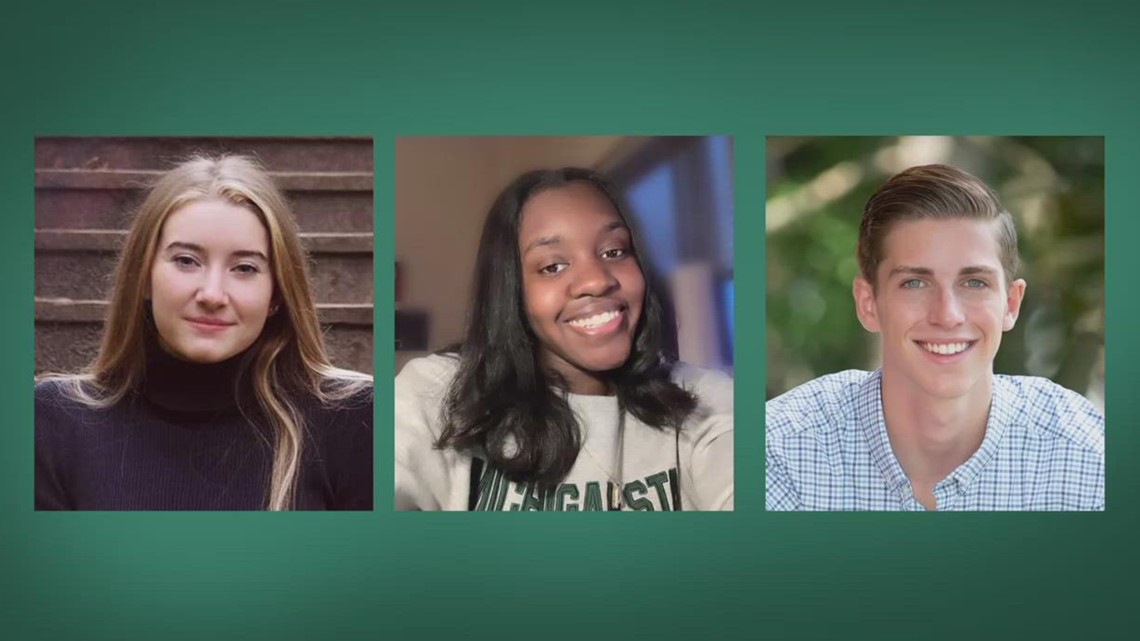
Alex Verner, Arielle Anderson and Brian Fraser were the three students who lost their lives in the MSU campus shooting.
Alexandria Verner
Verner, a 2020 graduate of Clawson High School, "was and is incredibly loved by everyone," Clawson district Superintendent Billy Shellenbarger said in a statement.
She was a junior at Michigan State studying integrated biology and anthropology.
"If you knew her, you loved her and we will forever remember the lasting impact she has had on all of us," he continued.
Verner is being remembered as a "tremendous" student, athlete and leader, someone who "exemplified kindness every day of her life!" The district leader said she started at Baker Preschool, moved on to Schalm Elementary School and finished at Clawson Middle and High School.
Her parents, Ted and Nancy, and sister Charlotte and brother TJ are "equally grieving but are certainly already feeling the uplifting support of this tremendous community."
Arielle Diamond Anderson
Arielle Anderson was a junior from Grosse Pointe.
The family of Arielle Anderson released the following statement:
“We lost our precious daughter, granddaughter, sister, niece, cousin, and friend, Arielle Anderson. She means the world to us. As much as we loved her, she loved us and others even more. She was passionate about helping her friends and family, assisting children and serving people.
“Driven by her aspiration to tend to the health and welfare of others as a surgeon, she was working diligently to graduate from Michigan State University early to achieve her goals as quickly as possible.
“As an Angel here on Earth, Arielle was sweet and loving with an infectious smile that was very contagious.
“We are absolutely devastated by this heinous act of violence upon her and many other innocent victims.
“While we appreciate the outpouring of the love, support, and prayers we have received thus far, we are grieving and hope that you respect our family’s wishes to remain private at this time.”
She, along with Brian Fraser, was a graduate of the Grosse Pointe Public School system.
Her family said she loved children and had dreams of one day becoming a pediatrician.
Brian Fraser
Fraser was a sophomore at Michigan State from Grosse Pointe.
He was the Michigan Beta Chapter president of Phi Delta Theta at Michigan State University.
"As the leader of his chapter, Brian was a great friend to his Phi Delt brothers, the Greek community at Michigan State, and those he interacted with on campus. Phi Delta Theta sends its deepest condolences to the Fraser family, the Michigan Beta Chapter, and all those who loved Brian as they mourn their loss," Phi Delta Theta International Fraternity said in a statement.
Posthumous Degrees
All three slain students received posthumous bachelor's degrees in their field of study.
“Alexandria, Arielle, and Brian will forever be Spartans. We’ve heard the heartfelt stories of their aspirations, their selfless dedication to their peers and communities, and their commitment to academic excellence," said Board Chair Dr. Rema Vassar. "Simply put, awarding each of them a bachelor’s degree is the least we can do to honor their families, commemorate their legacies, and commend their contributions to our Spartan community.”
Interim Provost Thomas Jeitschko said the degrees will "honor their legacies and recognize their commitment to Spartan values."
Honoring Those Hurt 5 Others Wounded
Five other students were critically wounded in the campus shooting.
All were rushed to Sparrow Hospital in Lansing where four out of the five underwent surgery.
Dr. Denny Martin, the interim president and chief medical officer at Sparrow Hospital broke down in tears when briefing the media about the students' condition.
MSU officials and the hospital have not shared the identities of the students wounded in the gunfire.
Through family fundraisers, we know the names of a few.
Guadalupe Huapilla-Perez was a junior at MSU studying hospitality business when she was shot on campus. Huapilla-Perez was shot twice, impacting five of her organs. Her family says she can get around with a walker and is working to recover.
Her family raised money on GoFundMe for her medical expenses, which included multiple surgeries and physical therapy.


Nate Statly was a junior at MSU when he was shot, according to a GoFundMe account set up by his brother.
After about 5 months in the hospital, Nate was moved to an inpatient rehab facility where he could continue physical therapy.
"He's the light in our family, he never stops making us laugh, and he is loved by so many," the page says about Nate Statly.

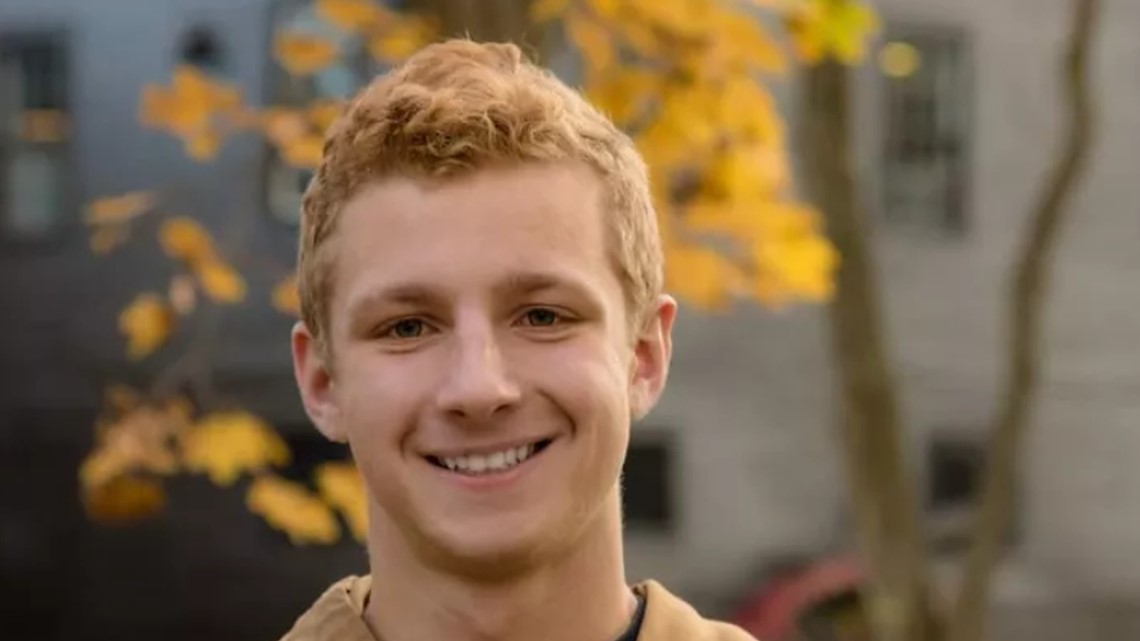
John Hao, an international student from China, was shot in the back and critically hurt on campus.
According to reports, a bullet severed his spinal cord leaving him paralyzed from the chest down.
His roommate set up a GoFundMe account to help him pay for medical expenses.
Troy Forbush, a music student at MSU, posted on Instagram identifying himself as a victim of the shooting. He was the first victim released from the hospital.
"I took a bullet to my chest, had a brush with death, and almost didn’t make it if it weren’t for the incredible doctors who saved my life in emergency surgery that night," he wrote.
Forbush called for change to prevent future mass shootings.
"There was a time when I used to dream of getting into this school — now, I represent it. My world has been turned upside down so suddenly but I refuse to be a number, a statistic," Forbush wrote. "Alongside my family, friends, community, university, & state government officials, we will enact change. I have a long journey of recovery ahead of me. This is only the beginning. Rest in power Alexandria, Arielle, and Brian."
In April 2023, the final student hospitalized was discharged from the hospital to another rehab facility.
Permanent Memorial Plans

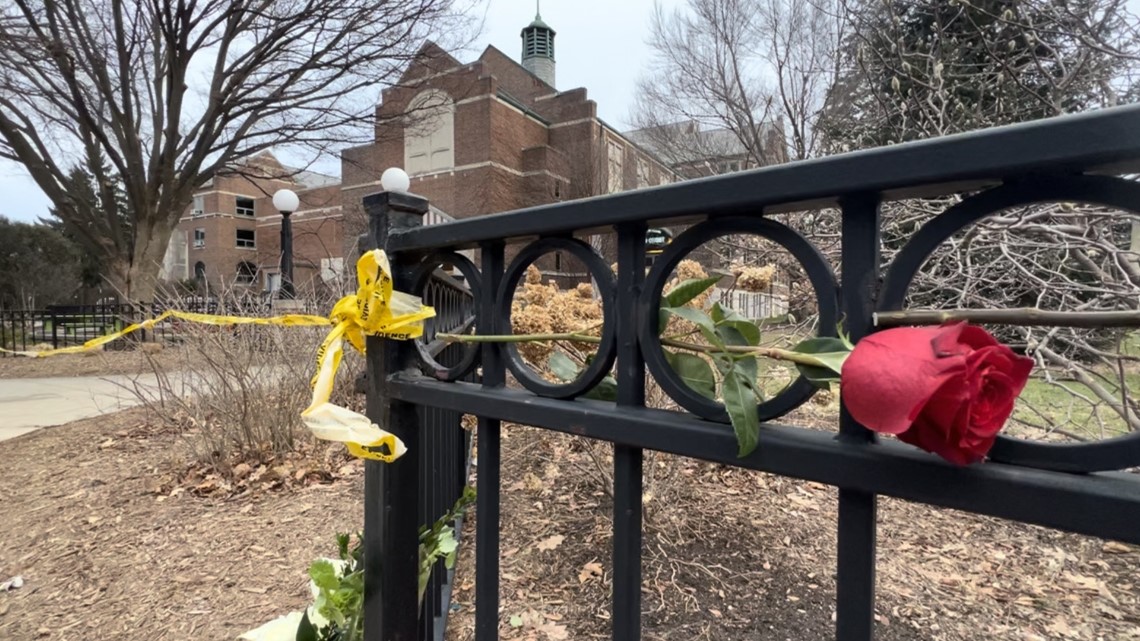
The university plans to create a permanent memorial to honor the victims of the shooting on campus.
Officials are taking feedback and input into the memorial in a survey. You can take that survey here until it closes on March 31, 2024.
MSU invites your contributions to the planning of a campus memorial. The survey will close on March 31, 2024.
Here is a timeline of the next steps in creating that permanent memorial:
- March: Two engagement sessions — one in person and one virtual — will be held. Feedback from the community survey will be presented for further conversation.
- Spring 2024: All community input will be synthesized and used to inform a request for artist proposals, or RFP, to design a permanent campus memorial.
- Fall 2024: The committee will present a final selection of proposals for additional community input. After a comment period, the memorial committee will summarize the responses and, in coordination with the Public Art on Campus Committee, recommend a final design.
- Spring 2025: Work to construct the permanent memorial is planned to start.
The Associated Students of Michigan State University donated a memorial bench in April 2023. The school said it will be installed in a small plaza near Berkey Hall, along with related landscaping updates, before the Spring 2024 graduation.
Spartan Strong Fund Mental Health Help

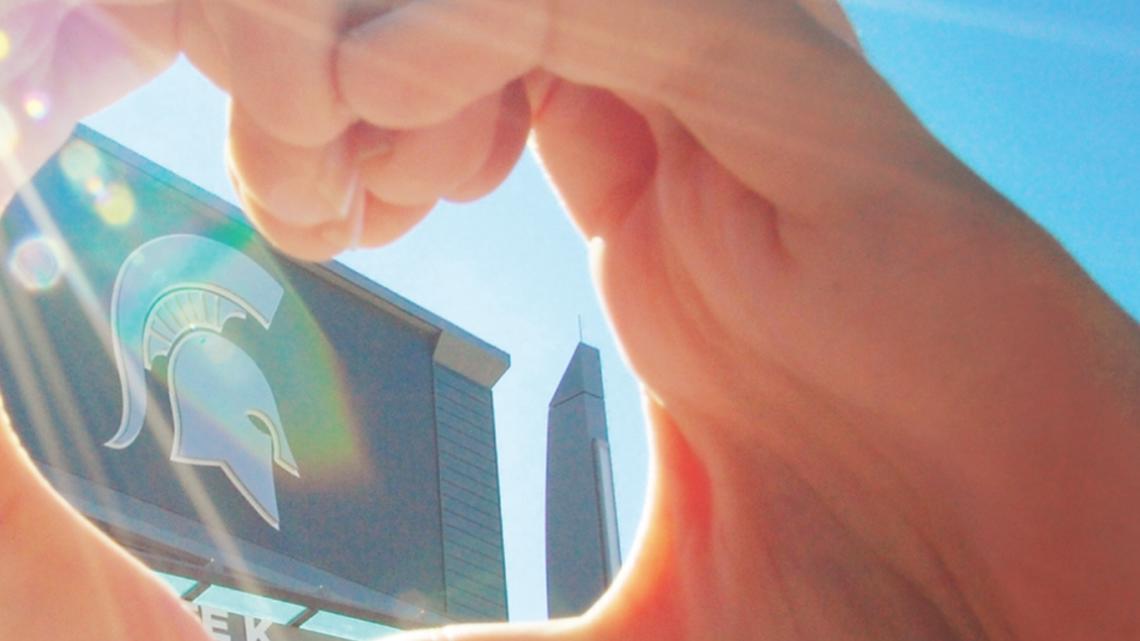
In the wake of the campus shooting, Michigan State University announced they would cover the cost of funerals and hospital bills for the students who were impacted.
More than 4,200 donors helped build up the fund to $2 million. Portions of the fund are available to anyone, from students to staff and first responders.
A quarter of the fund, $500,000, will be allocated to reimburse out-of-pocket expenses for mental health services.
Qualifying expenses include:
- Outpatient counseling and mental health care services, including telehealth
- In-patient hospitalization with a mental health diagnosis
- Residential mental health treatment
The rest of the ways the Spartan Strong Fund will be used to support students, including paying medical bills of students injured and the creation of memorials for the three students lost, can be found here.
“Utilizing the Spartan Strong Fund to support mental health services for students, staff, faculty and first responders affected by Feb. 13 is critical for facilitating their journey towards recovery,” said Assistant Provost and UHW Executive Director Alexis Travis, Ph.D.
“Each of us is impacted differently by Feb.13,” said Travis. “Trauma is experienced uniquely by individuals and each of us is on our own path toward healing. Not all Spartans may feel traumatized by Feb. 13, and that is OK too.”
So far the fund has received applications from 71 people.
You can submit your application for reimbursement here.
It could take up to 30 days for the reimbursement to be approved.
Spartans Coming Together Memorials then & now
In the days after the shooting, thousands of students and East Lansing community members gathered to keep vigil on campus. Beyond the MSU Union and Berkey Hall, two areas on campus stood out as spots to gather.
They brought flowers.
They made signs.
They lit candles and laid down teddy bears.
Students shared this outpouring of grief and support at several gathering places on campus: Spartan Statue and The Rock.
Spartan Statue

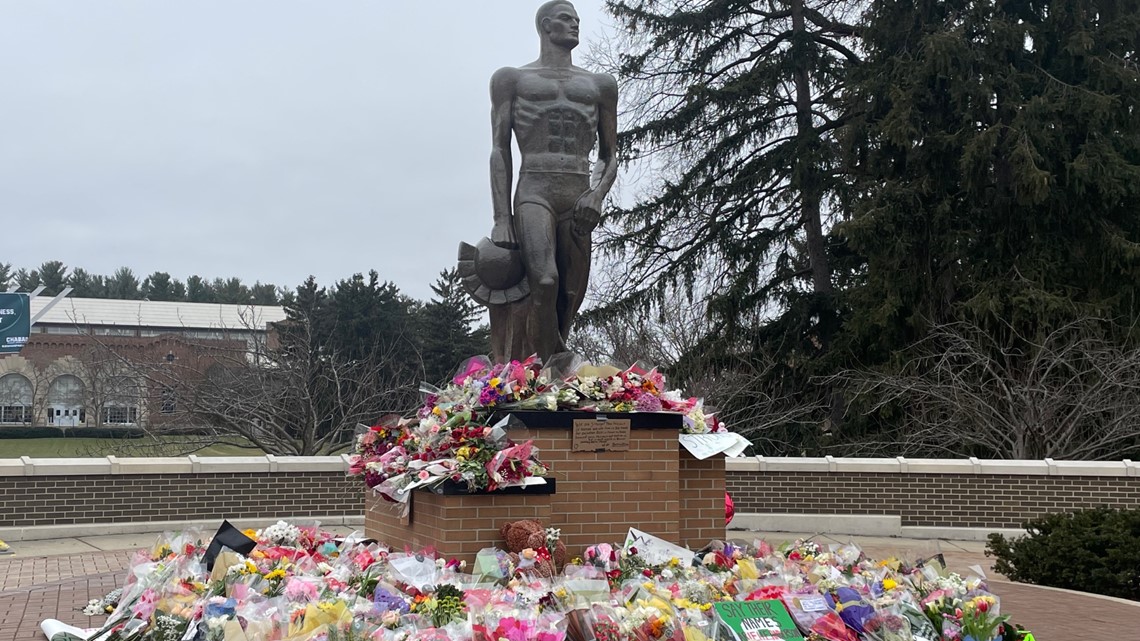
The nearly 10-foot-tall Spartan Statue, or Sparty as most call it, is a community icon and synonymous with MSU.
It's no surprise that Sparty became a symbolic gathering place for those to pay their respects, too.
In the days after the mass shooting, hundreds of students, faculty and members of the community paid a visit to Sparty to grieve.
Mourners left countless bouquets of flowers, mementos and other tokens at the foot of Sparty.
The Rock

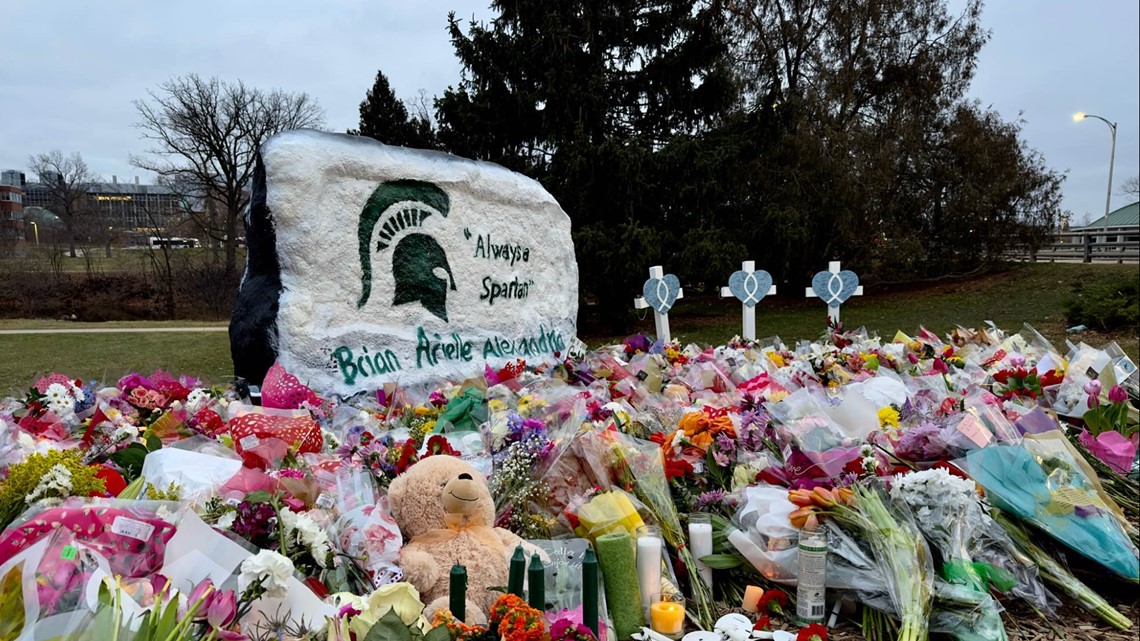
It's a site of protest. Celebration. Silliness. Grief.
The Rock is north of Red Cedar off Farm Lane on State's campus. It's a symbol that dates back to the 1870s and stands as a billboard of sorts.
It's decorated almost daily. And messages painted to The Rock morph with the spirit on campus.
In the hours and days following the mass shooting, students took paintbrushes to The Rock.
"How many more?"
"To those we have lost. To those who now heal. We stand Spartan Strong."
"Always a Spartan. Brian, Arielle, Alexandria."
These are some of the messages shared as others set down letters, signs and bouquets at the foot of The Rock.
You can view the virtual rock and all of the memorial messages painted on it following the attack on campus here.
The day-after vigil

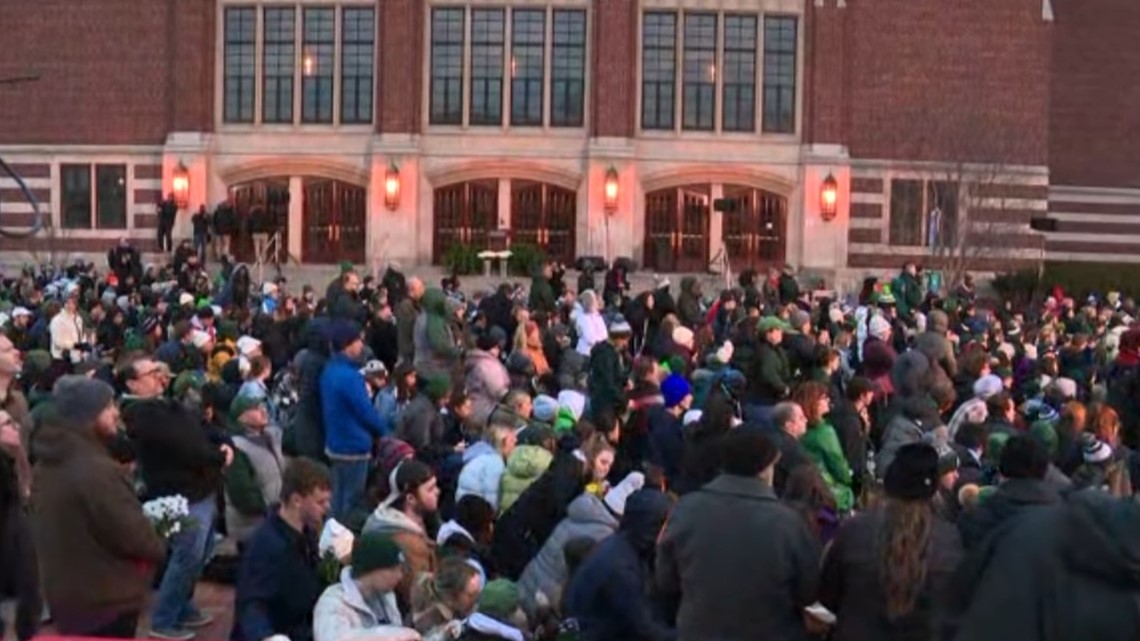
Coach Tom Izzo and Gov. Gretchen Whitmer spoke to students and staff as the community grieved the lives lost and those impacted by the violence on campus. They also shared a strong message of hope.
"Tonight I'm here as Governor, as a mom of two college kids, as a fellow Spartan as a fellow Michigander," she said that night "Our hearts break for those lives that were shattered by gun violence."
MSU basketball coach Tom Izzo, one of the most well-known public faces of the university addressed students that night.
"I've seen some incredible highs and yes, unfortunately, there have been some devastating lows," said Izzo. "But as a Spartan, we always get through it together. We are Spartan tough, Spartan strong."
Communities in East Lansing, Grand Rapids, Clawson, Grosse Pointe and elsewhere are also hosted vigils to honor Brian Fraser, Arielle Anderson and Alex Verner.
About a month after Feb. 13, 2023, it was time to remove the mountain of flowers from Sparty.
Campus officials said they would turn the flowers into mulch for a memorial tree.
Surviving two school shootings Students speak out
The father of a student who survived both the Oxford High School and Michigan State University mass shootings is sharing his experience as a parent during the unthinkable.
Matt Riddle's daughter, Emma, was at Oxford High School when a classmate opened fire in November 2021. Four students were killed and six students and a teacher were injured.
Emma was at MSU when a man began shooting in two areas of campus, killing three students and wounding five.
She posted a tweet that went viral, asking when gun violence and mass shootings will end:
As a parent, Matt said the first shooting Emma survived was shocking—and experiencing two separate shootings so close together was even harder.
"It's like anything else, you wish it didn't happen, and you wish there would be changes to stop it from happening, but you don't expect it to happen to you," Matt said.
He said on the day of the Oxford shooting, Emma called him in tears as she evacuated the school. He said by experiencing the same thing in the MSU shooting, it's amplifying the trauma she's already dealing with.
"She's feeling the same fear and emotions and the same trauma that she experienced 14 months ago, and it's happening again," he said. "So as a parent, it takes a piece of you. All you want to do is protect them, and all you want to do is keep them safe."
How MSU Sparked Gun Reform Protests, Activism and New Legislation

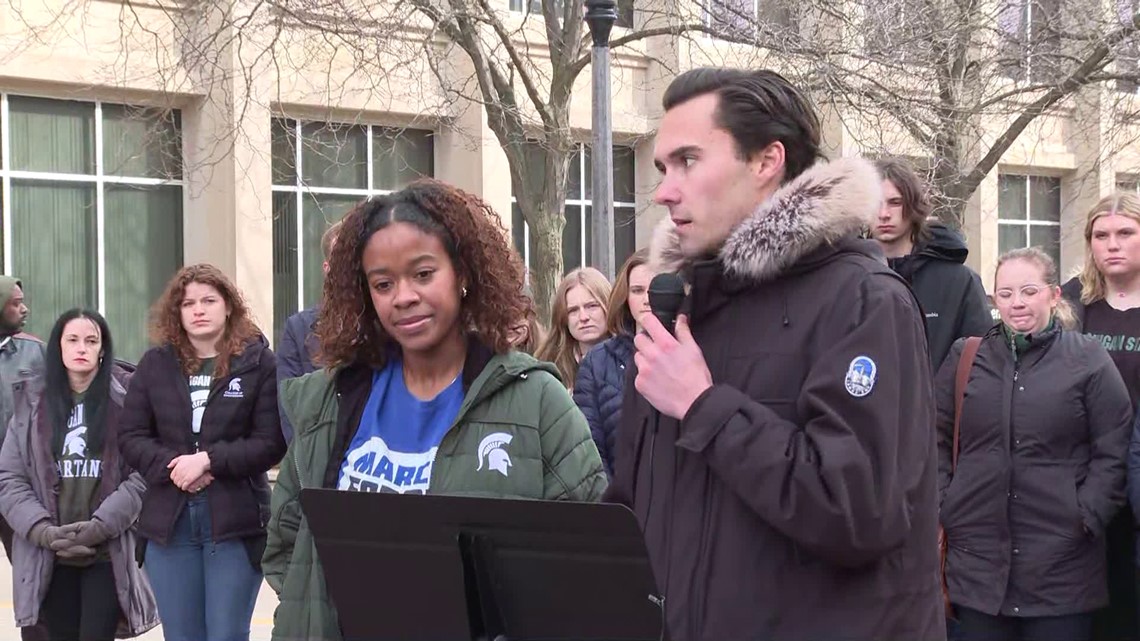
Student Activism
A large group of people, many of them Michigan State University students, held a sit-in on the steps of the capital building in Lansing two days after the tragedy on campus.
The deadly shooting at Michigan State came less than two years after a 15-year-old shooter killed four students and injured six more as well as a teacher at Oxford High School.
The shooting led to calls for action from students, gun violence organizations and politicians. President Joe Biden said he is committed to passing stricter gun control laws, and Michigan Democrats called for state gun laws to be considered.
Michigan Republicans said they are searching for solutions that target the source of the mass shooting issue, including mental health care and increased security for schools.
"I am filled with rage that we have to have another press conference to talk about our children being killed in their schools. And I would say that you either care about protecting kids or you don't. You either care about having an open honest conversation about what is going on in our society, or you don't," Rep. Elissa Slotkin, who also spoke on the steps of the state house, shared her frustration.
Many called for universal background checks for those buying firearms as well as safe gun storage requirements.
March For Our Lives co-founder David Hogg, who survived the Parkland school shooting in 2018, also showed support for MSU in calling for stricter gun control.
New Gun Laws
Calls for change in the months following the shooting resulted in a flurry of new laws that state legislators and gun safety activists have said they believe will help make the state a safer place.
Gov. Gretchen Whitmer signed gun violence prevention bills into law at Michigan State University's Spartan Stadium, two months after the deadly shooting at MSU. With the stroke of the governor’s pen, universal background checks for all guns and safe storage are now law in Michigan.
Advocates are calling it a major step forward for gun reform in Michigan.
The governor was joined by lawmakers, law enforcement officials and survivors of gun violence, as well as members of the grassroots movement Moms Demand Action.
Safe Storage and Universal Background Checks
One of the bills Gov. Whitmer signed requires universal background checks. Under the new legislation, anyone who does not have a gun license will have to undergo a federal national instant criminal background check before they can buy a firearm.
Plus, safe storage laws, which state a person must keep an unloaded firearm in a locked storage box or container.
There are consequences for those found guilty of violating the laws including fines and, in the case of the safe storage law, jail time.
These bills were pushed through by the Democratic majority and passed mostly along party lines with some Republican support.
"We don't have to live like this, and today, we are showing we're not going to anymore," Whitmer said.
The new secure storage law, Public Act 17 of 2023, requires gun owners to keep unattended weapons unloaded and locked with a locking device or stored in a locked box or container if it is reasonably known that a minor is likely to be present on the premises.
If you fail to store a firearm as required and a minor gets ahold of the firearm and any of the following happens, you are guilty of a crime under Public Act 16 of 2023:
- If the minor possesses or exhibits the firearm in a public place or possesses or exhibits the firearm in the presence of another person in a careless, reckless or threatening manner: a misdemeanor punishable by imprisonment for up to 93 days or a fine of up to $500, or both.
- If the minor discharges the firearm and injures themselves or another individual: a felony punishable by imprisonment for up to five years or a fine of up to $5,000, or both.
- If the minor discharges the firearm and inflicts serious impairment of a body function on themselves or another individual: a felony punishable by imprisonment for up to 10 years or a fine of up to $7,500, or both.
- If the minor discharges the firearm and inflicts death on themselves or another individual: a felony punishable by imprisonment for up to 15 years or a fine of up to $10,000, or both.
You can learn more about firearms safety and the new storage law here.
Red Flag Law
The state legislature passed and Gov. Whitmer also signed a "red flag" bill into law, which is designed to prevent a person in crisis from using a gun to hurt themselves or others.
“No Michigander should fear going to school, work, the grocery store, or their own home because of gun violence,” Gov. Whitmer said. “Extreme risk protection orders have been proven to reduce suicides, save lives, and keep guns out of the hands of domestic abusers and violent criminals. I am proud to sign this legislation to keep Michiganders safe, and I want to thank my partners in the legislature for getting this done, the advocates who fought so hard to make this happen, and every Michigander who works hard to build safe communities where everyone can thrive. Only thoughts and prayers aren’t enough. Let’s keep taking commonsense action to reduce gun violence and keep families and communities safe.”
The Extreme Risk Protection Order Act allows specific people, like a spouse or family member, to ask a circuit court to enter an extreme risk protection order for a person at risk of harming themselves or others with a gun.
If the court decides the person poses a significant threat to themselves or others, the protection order would prohibit that person from having or buying a firearm while the order is in effect.
These new laws go into effect in 2024.
Mental Health Resources
MSU Counseling and Psychiatric Services and the MSU Employee Assistance Program have long-term mental health support for students and staff.
The MSU Department of Psychiatry partnered with the MSU Office for Resource and Support Coordination to continue providing treatment to members of the campus and broader East Lansing community seeking support.
The Resiliency and Recovery Subspecialty Clinic is offering trauma-focused psychiatric consultations and follow-up services. The clinic, which has immediate openings, has set aside time each week for treatment, therapy, and potential medication management for MSU and broader East Lansing community members impacted by Feb 13.
For more information or to schedule an appointment, please call 517-353-3070.
If you or someone you know are experiencing a mental health crisis, help is available. You can call the National Suicide and Crisis Lifeline at 988 24/7.
►Make it easy to keep up to date with more stories like this. Download the 13 ON YOUR SIDE app now.
Have a news tip? Email news@13onyourside.com, visit our Facebook page or Twitter. Subscribe to our YouTube channel.
Watch 13 ON YOUR SIDE for free on Roku, Amazon Fire TV Stick, Apple TV and on your phone.


